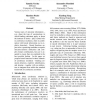Free Online Productivity Tools
i2Speak
i2Symbol
i2OCR
iTex2Img
iWeb2Print
iWeb2Shot
i2Type
iPdf2Split
iPdf2Merge
i2Bopomofo
i2Arabic
i2Style
i2Image
i2PDF
iLatex2Rtf
Sci2ools
COLING
2008
2008
Coreference Systems Based on Kernels Methods
Various types of structural information e.g., about the type of constructions in which binding constraints apply, or about the structure of names - play a central role in coreference resolution, often in combination with lexical information (as in expletive detection). Kernel functions appear to be a promising candidate to capture structure-sensitive similarities and complex feature combinations, but care is required to ensure they are exploited in the best possible fashion. In this paper we propose kernel functions for three subtasks of coreference resolution - binding constraint detection, expletive identification, and aliasing - together with an architecture to integrate them within the standard framework for coreference resolution.
COLING 2008 | Computational Linguistics | Coreference Resolution | Expletive Detection | Kernel Functions |
Related Content
| Added | 29 Oct 2010 |
| Updated | 29 Oct 2010 |
| Type | Conference |
| Year | 2008 |
| Where | COLING |
| Authors | Yannick Versley, Alessandro Moschitti, Massimo Poesio, Xiaofeng Yang |
Comments (0)

